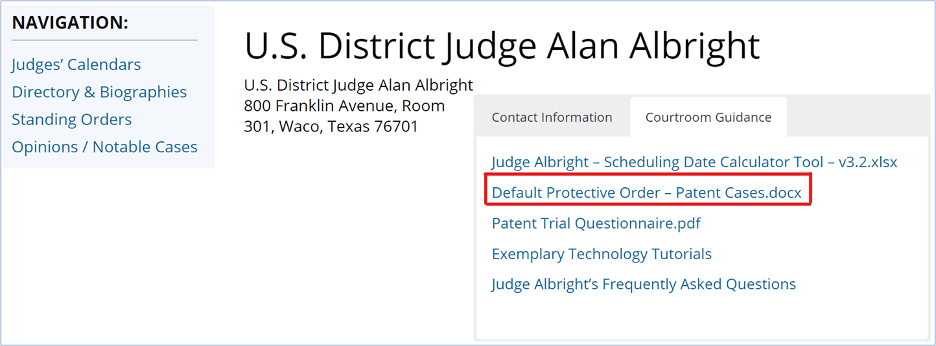Yesterday the Court posted a new Default Protective Order – Patent Cases. Beyond the direct link in our post, you can find it on the “Courtroom Guidance” tab of Judge Albright’s page on the WDTX website, as pictured above. Judge Albright has stated in the context of his prior Working Group meetings that this Default PO is not intended as a be-all, end-all—but simply as a starting point from which the parties to any given litigation can tailor case-specific needs or preferences.
We’re not going to go into excruciating detail here, but we’ll note that the starting point for Judge Albright’s Default PO was the Protective Order – Patent used in the Eastern District of Texas by that Court’s Marshall, Tyler, and Texarkana Divisions (link is to the version posted by Judge Gilstrap’s chambers). As such, any litigant with experience in that Court will find most aspects of Judge Albright’s Default PO to be pretty familiar. A few of the relatively minor updates relative to the EDTX PO are:
- Judge Albright’s Default PO uses the word “Confidential” rather than the EDTX’s “Restricted.”
- Judge Albright’s Default PO has a four-tier structure (Confidential, Confidential – AEO, Confidential – Outside AEO, and Confidential – Source Code), rather than the EDTX’s three-tier version (¶ 3).
- Judge Albright’s Default PO requires slightly more robust disclosures by experts before they may be granted access to confidential materials (¶ 5(e)).
- Judge Albright’s Default PO explicitly requires designating parties to “accommodate reasonable requests to provide summary information to in-house counsel …. who exercise no competitive decision-making authority on behalf of the client and reasonably require access to such information” (¶ 10).
- The prosecution bar provision of Judge Albright’s Default PO explicitly notes that “Nothing in this Order shall prevent a person with access to HIGHLY SENSITIVE MATERIAL from participating in a PTO proceeding, e.g., IPR or PGR, except for that person shall not participate—directly or indirectly—in the amendment of any claim(s)” (¶ 12).
The Court has previously expressed hopes that posting a Default PO will help streamline parties’ negotiations and minimize disputes that need to reach the Court’s attention. Now’s our chance to see how that works out in practice.

